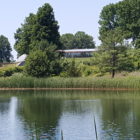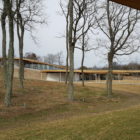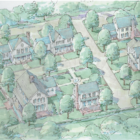Government
Town to Grace Farms: Supply a List of Scheduled Events and, For Now, Stop Booking New Ones
|
Town officials on Monday instructed Grace Farms to stop booking new events on its campus and provide details of all activities planned for the next six months, pending a final decision of a yet-to-be-filed application to amend its operating permit. Citing “outstanding violations” of Grace Farms’ existing permit, the town planner in a letter obtained by NewCanaanite.com specified that the organization’s list of activities “shall include the date of the event, the event or group name, the location of the property, start and end times, and the number of attendees expected.”
Town Planner Steve Palmer also instructed Grace Farms to file its new application within 45 days—rather than 60, as the organization had proposed—and called for stronger measures to prevent visitors from wandering toward neighbors’ properties. “These additional measures are integral to this process and compliance with them will be a consideration of the [Planning & Zoning] Commission’s review of the future Special Permit application,” Palmer said. The measures come one week after Grace Farms withdrew an application to amend its zoning permit—a decision prompted by the findings of a third-party consultant that found the application lacking. According to Simsbury-based consulting firm Planimetrics, Grace Farms instead of seeking to add new principal uses to its approved use as a religious institution, should put in for an entirely new special permit.




